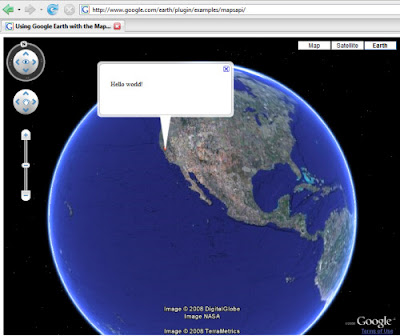Google Earth can now be used from a browser, without having to install the full application. Instead of the application, you need to install a plug-in that only works in Firefox and Internet Explorer 6/7 on Windows.
Google also launched an JavaScript API that lets you interact with the globe, draw markers, add layers or integrate with Google Maps. "The Google Earth Plug-in and its APIs let you embed the full power of Google Earth and its 3D rendering capabilities into your web pages." Google LatLong blog announced that each Google Maps mashup can take advantage of the new 3D view by adding a single line of code. "Our goal is to open up the entire core of Google Earth to developers in the hopes that you'll build the next great geo-based 3D application, and change how we view the world."
The samples look pretty promising, but I find it hard to understand why Google didn't use the API to create a better experience and bring more features from Google Earth (the search box, the list of overlays, the navigation controls) in a single interface.
 Before downloading the plugin, please note that Google installs it in Firefox and Internet Explorer, along with a system service called "Google Update Service". The plug-in uses a lot of memory (around 100 MB just for loading the initial view and 300 MB for the Monster Milktruck demo) and, for each embedded object, you're running an instance of the Google Earth application.
Before downloading the plugin, please note that Google installs it in Firefox and Internet Explorer, along with a system service called "Google Update Service". The plug-in uses a lot of memory (around 100 MB just for loading the initial view and 300 MB for the Monster Milktruck demo) and, for each embedded object, you're running an instance of the Google Earth application.Google Earth
